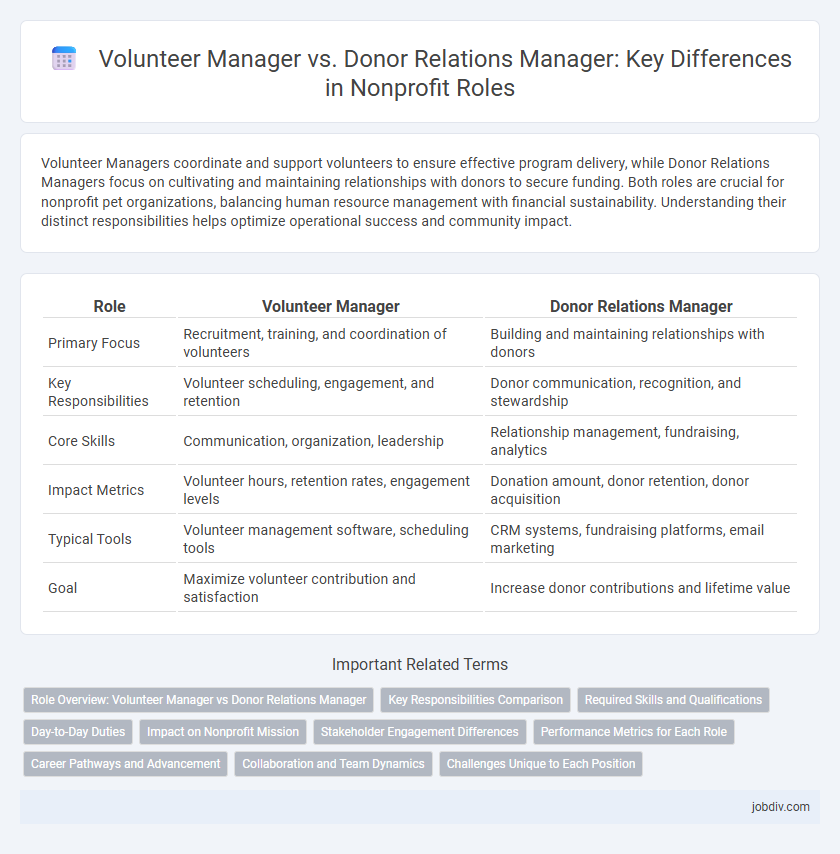Volunteer Managers coordinate and support volunteers to ensure effective program delivery, while Donor Relations Managers focus on cultivating and maintaining relationships with donors to secure funding. Both roles are crucial for nonprofit pet organizations, balancing human resource management with financial sustainability. Understanding their distinct responsibilities helps optimize operational success and community impact.
Table of Comparison
| Role | Volunteer Manager | Donor Relations Manager |
|---|---|---|
| Primary Focus | Recruitment, training, and coordination of volunteers | Building and maintaining relationships with donors |
| Key Responsibilities | Volunteer scheduling, engagement, and retention | Donor communication, recognition, and stewardship |
| Core Skills | Communication, organization, leadership | Relationship management, fundraising, analytics |
| Impact Metrics | Volunteer hours, retention rates, engagement levels | Donation amount, donor retention, donor acquisition |
| Typical Tools | Volunteer management software, scheduling tools | CRM systems, fundraising platforms, email marketing |
| Goal | Maximize volunteer contribution and satisfaction | Increase donor contributions and lifetime value |
Role Overview: Volunteer Manager vs Donor Relations Manager
Volunteer Managers oversee recruitment, training, and scheduling of volunteers, ensuring alignment with nonprofit mission and maximizing community engagement. Donor Relations Managers focus on cultivating and maintaining relationships with donors, managing fundraising campaigns, and ensuring donor retention through personalized communication and stewardship. Both roles are critical for nonprofit sustainability, with Volunteer Managers driving program support and Donor Relations Managers securing financial resources.
Key Responsibilities Comparison
Volunteer Managers oversee recruitment, training, and retention of volunteers, ensuring alignment with organizational goals and coordinating volunteer activities effectively. Donor Relations Managers focus on cultivating and maintaining relationships with donors, managing communication strategies, and organizing fundraising initiatives to maximize donor engagement and contributions. Both roles require strong interpersonal skills, but Volunteer Managers emphasize operational volunteer support while Donor Relations Managers prioritize donor stewardship and fundraising outcomes.
Required Skills and Qualifications
Volunteer Managers require strong organizational skills, excellent communication, and the ability to motivate and coordinate diverse groups of volunteers. Donor Relations Managers need expertise in fundraising, donor stewardship, and data analysis to build and maintain long-term relationships with supporters. Both roles benefit from proficiency in CRM software, strategic planning, and a deep understanding of the nonprofit sector's mission and goals.
Day-to-Day Duties
Volunteer Managers coordinate recruitment, training, and scheduling of volunteers to ensure smooth event execution and program support. Donor Relations Managers focus on maintaining communication, managing donor databases, and organizing fundraising campaigns to secure ongoing financial support. Both roles require strong interpersonal skills but differ in their core daily tasks of managing people versus managing donor engagement.
Impact on Nonprofit Mission
Volunteer Managers cultivate a dedicated volunteer workforce by coordinating recruitment, training, and engagement, directly amplifying the nonprofit's capacity to deliver programs and services. Donor Relations Managers focus on building and sustaining donor partnerships, securing vital funding streams that enable the nonprofit to expand its initiatives and achieve long-term sustainability. Both roles are essential, with Volunteer Managers driving hands-on mission execution and Donor Relations Managers ensuring financial resources to support organizational goals.
Stakeholder Engagement Differences
Volunteer Managers focus on recruiting, training, and retaining volunteers, fostering direct and hands-on engagement with individuals who contribute their time and skills to the nonprofit's mission. Donor Relations Managers prioritize building and maintaining relationships with financial contributors by managing communications, stewardship activities, and recognition programs to encourage ongoing support. The key difference lies in Volunteer Managers engaging active participants in service delivery, while Donor Relations Managers cultivate financial and philanthropic support through targeted relationship management.
Performance Metrics for Each Role
Volunteer Managers measure success through volunteer retention rates, hours contributed, and event participation levels, reflecting their ability to engage and sustain a committed volunteer base. Donor Relations Managers track donor retention rates, average donation size, and the frequency of donor interactions to optimize fundraising performance and cultivate long-term support. Both roles rely on targeted metrics that directly impact nonprofit growth and program sustainability.
Career Pathways and Advancement
Volunteer Managers typically advance by developing leadership skills and gaining experience in community outreach, moving towards roles like Volunteer Program Director or Nonprofit Operations Manager. Donor Relations Managers progress by honing fundraising expertise and relationship-building abilities, often transitioning into positions such as Development Director or Chief Development Officer. Both career pathways offer growth opportunities through strategic involvement in nonprofit management, grant writing, and stakeholder engagement.
Collaboration and Team Dynamics
Volunteer Managers and Donor Relations Managers collaborate closely to optimize nonprofit impact by aligning volunteer engagement with fundraising goals. Effective team dynamics are fostered through regular communication, shared objectives, and coordinated strategies that amplify donor contributions and volunteer participation. This synergy strengthens organizational capacity, enhances stakeholder relationships, and drives mission success.
Challenges Unique to Each Position
Volunteer Managers face challenges in recruitment, retention, and scheduling flexibility, requiring personalized engagement strategies to maintain volunteer motivation and commitment. Donor Relations Managers encounter difficulties in cultivating long-term donor loyalty, managing diverse donor expectations, and ensuring transparent communication to sustain financial support. Both roles demand strategic relationship-building but differ in focus, with Volunteer Managers prioritizing human resource dynamics and Donor Relations Managers emphasizing donor stewardship and fundraising efficacy.
Volunteer Manager vs Donor Relations Manager Infographic

 jobdiv.com
jobdiv.com